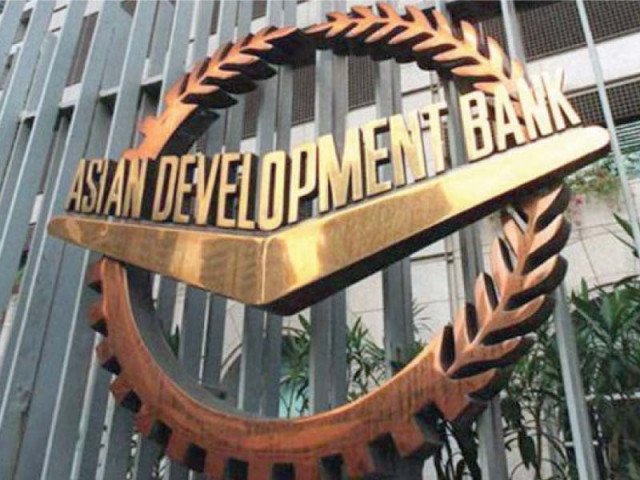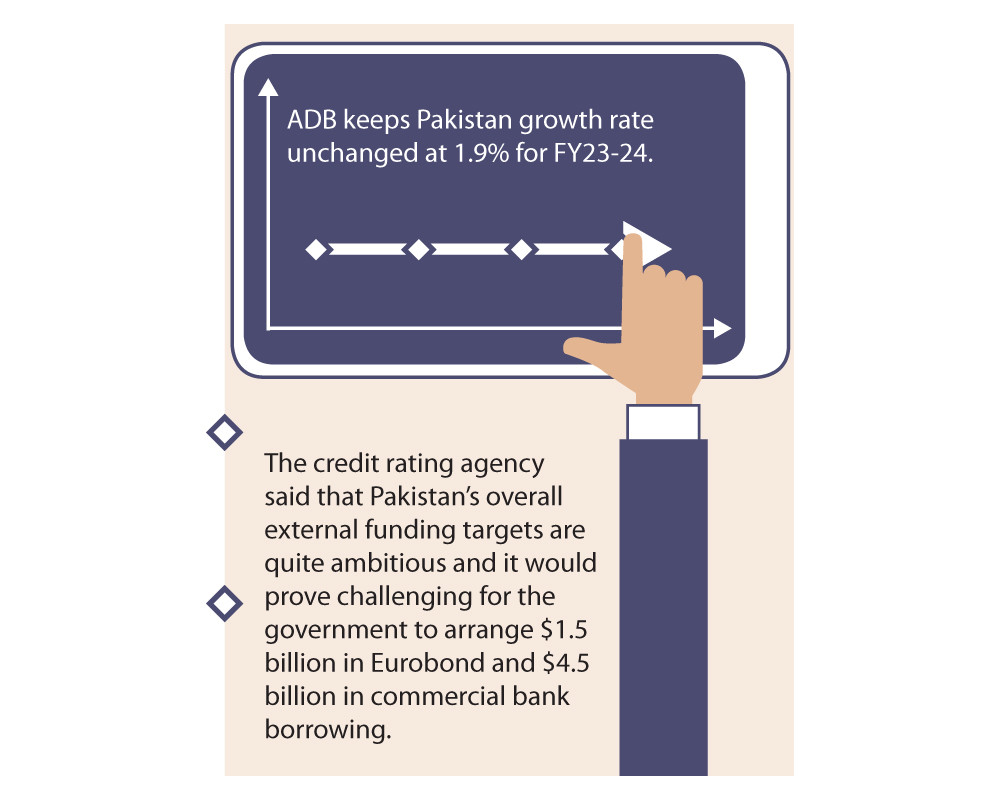ADB keeps growth forecast at 1.9%
Report cites moderate economic confidence, high inflation as constraints

The Asian Development Bank (ADB) on Wednesday kept Pakistan’s economic growth forecast unchanged at 1.9% due to a moderate level of confidence in the economy but expected some ease in inflation – the projections that are in line with Islamabad’s expectations.
“Pakistan’s overall recovery is still constrained by moderate confidence and high inflation eroding purchasing power,” according to the Asian Development Outlook update report that the Manila-based lender released on Wednesday.
The ADB has not changed its last economic growth forecast of 1.9% for Pakistan for this fiscal year. But the lender has revised upward the growth forecast for South Asia to 5.7% in 2023 mainly on higher-than-expected growth in India for the July–September quarter.

design: Ibrahim Yahya
Growth forecasts for the sub-region for 2024 are maintained at 6%, despite downward revisions in the forecasts for Bangladesh and Maldives. The 2024 growth projections for the sub-region’s other economies are unchanged, according to the ADB.
The ADB released the report a day after the central bank kept its policy rate unchanged at 22% due to a tight external financing position that did not allow any cut in the rate. On the growth front, the State Bank of Pakistan (SBP) also said that the economic recovery during this fiscal year is expected to remain moderate.
The International Monetary Fund (IMF) has also cut Pakistan’s growth forecast to 2% during the recent review talks. Pakistan had last month officially downward revised the growth estimates to a nominal contraction of 0.2%.
Fitch Ratings, a US-based credit rating agency, on Wednesday also kept Pakistan’s credit rating unchanged at CCC, contrary to the government’s expectation that it was expecting an improvement in the rating on the back of successful completion of the first review of the $3 billion bailout package.
The credit rating agency said that Pakistan’s overall external funding targets are quite ambitious and it would prove challenging for the government to arrange $1.5 billion in Eurobond and $4.5 billion in commercial bank borrowing.
The rating agency said that it expects elections to take place as scheduled in February and a follow-up IMF programme to be negotiated quickly after the SBA finishes in March 2024, but there is still the risk of delays and uncertainty around Pakistan’s ability to do this.
The federal government last month released the first quarter GDP growth figures, estimating the economy growing at a rate of 2.1% during the July-September quarter.
The central bank underlined that as per earlier expectations, recovery in the agriculture sector was the major driver of this growth. The manufacturing sector also recorded a moderate recovery, with growth in large-scale manufacturing becoming positive after contracting in the preceding four quarters. Unlike the commodity-producing sector, growth in the services sector remained subdued.
In its September outlook report, the ADB had said that Pakistan’s economy stood out as an outlier in Asia due to the highest inflation rate but the fourth lowest economic growth rate among all 46 economies in the region.
On the inflation front, the ADB has expected some slowdown in the inflation rate during the coming months.
“Pakistan’s inflation rate averaged 28.5% over July–October but is expected to ease amid fiscal consolidation and monetary tightening, as well as the improved availability of food and key imported inputs,” according to the ADB report.
Three months ago, the ADB projected Pakistan’s inflation at 25%, sharply higher than the earlier 15% projection. “In the last fiscal year, inflation is estimated to have accelerated to 29.2% in FY2023, faster than the previously forecasted 27.5% in April,” according to the ADB.
The inflation forecast for South Asia is unchanged at 8.6% for 2023, but revised up to 6.7% for 2024.
The central bank also said a day earlier that inflation expectations of both consumers and businesses, though improving in recent months, remained at an elevated level. It said that, barring a further sizable increase in administered prices, headline inflation will decline significantly in the second half of this fiscal year due to contained aggregate demand, easing supply constraints, moderation in international commodity prices and a favourable base effect.
After increasing the gas prices up to 520% in November, the government is again in the process of further increasing the prices with effect from next month.
Published in The Express Tribune, December 14th, 2023.
Like Business on Facebook, follow @TribuneBiz on Twitter to stay informed and join in the conversation.





1710175205-0/image-(9)1710175205-0-208x130.webp)













COMMENTS
Comments are moderated and generally will be posted if they are on-topic and not abusive.
For more information, please see our Comments FAQ